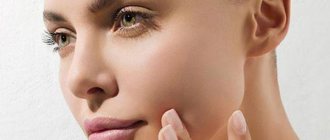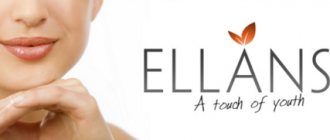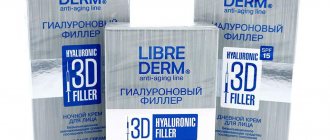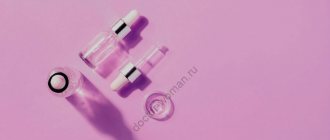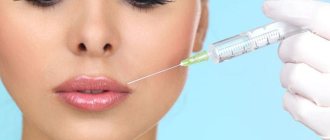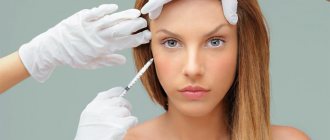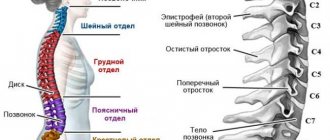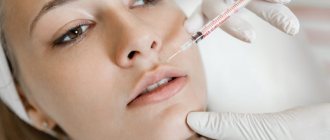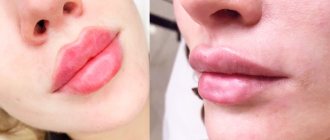Cheekbone contouring is an injection procedure for correcting the shape and volume of the cheekbone area by injecting a drug based on hyaluronic acid.
Correction with fillers allows you to harmonize the proportions of your face, make your cheekbones more expressive, emphasizing your accents in your appearance, eliminate age-related changes in your face and restore lost volume. By injecting filler with a cannula needle, you can simultaneously add volume to your cheekbones and eliminate nasolabial folds.
Popularity of contouring
In the desire to please oneself, the procedure for lip augmentation has long become popular in order to look like the standard of beauty - Angelina Jolie. Then the actress’s fans wanted cheekbones like the Hollywood diva’s.
It was because of them that many exhausted themselves with diets and resorted to removing Bisha's lumps (surgeries). But cosmetologists offer another option - injection modeling of cheekbones using fillers based on various components. Contour plastic helps to change the face, making it more expressive and beautiful. Experts say that it is the cheekbones that shape the perception of the face by other people, but most often they are not expressed and do not protrude as we would like.
Contouring of cheekbones with fillers is, first of all, a correction of age-related changes. With age, tissues begin to undergo gravitational changes - ligaments stretch, the middle third of the face loses volume and becomes flattened, excess tissue appears in the lower third, and wrinkles become more pronounced. Due to injections, the volume returns, the tissues straighten, lift - the face immediately looks fresher and younger. Accordingly, the procedure is not a tribute to fashion, but a necessity if there are indications for the use of fillers.
Anatomy of the upper third of the face
When working in the upper third of the face, the physician must understand the key vascular anatomical structures.
These include anastomoses and connections, namely the supraorbital and supratrochlear arteries, which are the terminal branches of the ophthalmic artery and originate from the internal carotid artery, and the superficial temporal artery, which is the terminal branch of the external carotid artery. The main nerve bundles in this area are the supratrochlear nerve, which is woven into the corrugator and lies under the frontalis fascia, innervating the middle and central zones of the forehead, and the supraorbital nerve, which emerges from the superior orbital fissure and passes under the frontalis fascia, innervating the anterolateral frontal lobe and scalp.
How is cheekbone correction done with fillers?
At the initial appointment, the cosmetologist determines the skin type, identifies existing problems, selects the necessary drug and its dosage. The procedure then includes the following steps:
- Cleansing the skin of impurities and residues of decorative cosmetics.
- Applying an anesthetic cream to make the procedure as comfortable and pain-free as possible.
- Marking. The doctor uses a special pencil to mark the injection site of the drug and the area where it will be distributed. The marks are easily washed off with water after the procedure.
- Administration of the drug by injection, distribution under the skin.
- Repeated skin cleansing with disinfectants.
At the end, the result is assessed. In some cases, a repeat visit may be required to correct the effect.
Contraindications for correction
Cheekbone plastic surgery with fillers is contraindicated for:
- tendency to form keloid scars;
- pathologies of the blood coagulation system;
- pregnancy, lactation;
- HPV infections (human papillomavirus) with the formation of condylomas;
- oncological diseases;
- rehabilitation after complex cosmetic procedures and operations;
- autoimmune diseases;
- bacterial, viral, fungal skin lesions;
- temperature rise.
With some contraindications, the procedure is permitted, but after normalization of health, for example, in the presence of fever, during an exacerbation of chronic diseases, acute respiratory viral infections, etc.
What are the types of fillers?
Cosmetologists use 3 main types:
- Synthetic. One of the first, developed back in the 60s. Made from paraffin or silicone base. Their disadvantage is the high probability of allergic reactions, the inability to be excreted on their own, that is, they remain in the body. Under the influence of gravity, they go down over time, leading to facial deformation.
- Biosynthetic. After assessing the negative aspects of synthetic drugs, the next generation of fillers was created - a mixture of biological substances and synthetics. The combination gave excellent results and significantly reduced the likelihood of unwanted reactions. The composition may contain calcium hydroxyapatite, collagen, polylactic acid and other components.
- Biodegradable. The most sought after and popular group, which is based on hyaluronic acid - a natural substance that is found in many tissues of the body. They rarely cause negative reactions. Among the advantages, it is necessary to highlight their safety, hypoallergenicity, self-resorption and removal from the body naturally. The preparations have the appearance of a dense gel, creating the desired volume without the effect of dripping. The substance is evenly distributed, improves metabolism, activates the production of collagen and elastin, which makes the skin young and elastic. Due to hyaluronic acid, the skin is moisturized as water molecules are attracted.
Our clinic of modern cosmetology “Estelab” uses fillers based on hyaluronic acid or calcium hydroxyapatite for correction. The second drug is chosen for the edematous-deformative type of aging; it does not attract water and does not cause swelling.
Number of sessions
Correction of cheekbones with fillers involves only one procedure, without a course. You will notice visible results immediately, without leaving the cosmetologist’s office. But the full result will appear in about two weeks. By this time, the body will begin to produce its own collagen and elastane, and the cheekbones will take on a natural, expressive shape and volume.
The tightening effect lasts from 8 months to two years, depending on the drug and the physiological characteristics of the patient’s body. At the end of this period, it is recommended to repeat the cheekbone correction session by contacting our clinic for services.
Preparations for correction of the zygomatic region
Cosmetologists use the following drugs:
- Restylane perlane (Restylane Perlane). Produced by a Swedish pharmaceutical company. Contains: hyaluronic acid, sodium chloride. The products of this manufacturer are of high quality, have undergone numerous studies and are completely safe. The drug has a high level of viscosity, due to which it remains deep in the skin for a long time. Disintegration begins after 6 months, complete elimination - after about a year. Recommended for medium and deep folds, to increase the volume of soft tissues.
- Restylane sab q (Restylane Sub-Q). Another product from a previous manufacturer with hyaluronic acid. Used primarily to create volume in the area of the cheeks and cheekbones.
- Juvederm voluma (Juvederm Voluma). One of the most popular hyaluronic acid fillers in the USA and Europe. The manufacturer is American, producing products for cosmetology and various branches of medicine. Voluma has a very dense structure compared to other drugs in this line, so it is used only for contouring. The filler is recommended for middle-aged women to replenish the volume of the face in the middle part.
- Radiesse. (Radiesse). Developed by the American company BioForm Medical, but owned by the German company. Consists of calcium hydroxyapatite, an aqueous gel carrier. The first component is produced synthetically, but it is completely identical to the substances in human bones and teeth. This ensures its safety and biocompatibility. The drug does not retain water, corrects even deep wrinkles, and replenishes missing volumes.
Aesthetic cosmetology in Moscow
uses only proven drugs that have undergone research and confirmed their safety and effectiveness. The specialist selects the necessary filler, taking into account existing problems, the goals of the procedure, and the client’s wishes.
Aesthetic medicine for the upper third of the face
In the case of female patients, there are unspoken norms of aesthetics, what features need to be given to the face in order to make it beautiful and harmonious.
Thus, the ideal forehead should have a slight convex curve of 12 to 14 degrees vertically, and the glabella area should have a smooth contour; there should be no wrinkles on both the forehead and the glabella area, and you should also take care of the tone and texture of the skin.
The temples should be flat or slightly convex, without pronounced retraction, drooping or voids. An aesthetically attractive female eyebrow should be located above the supraorbital rim; its middle part (“head”) should be slightly lower than the side (“tail”).
In the central part, the eyebrow should vertically coincide with the lateral limb of the iris. A man's eyebrow should lie on the supraorbital edge and be lower and “flatter” than a woman's. The outer edge of the eyebrow should lie above or at the same height as the medial edge, this line should run evenly along the entire length of the eyebrow, overlapping the sharp bony protrusions.
The upper eyelid should be “full” and follow a natural arch without creating a “hood”.
Effect after cheekbone augmentation with fillers
Clients notice improvements immediately after the procedure. Some formulations require about a day to smooth out creases at the injection site. General results of contouring:
- improvement of facial contours;
- more pronounced, defined cheekbones;
- smoothing wrinkles;
- reducing the severity of the nasolacrimal groove (due to raising the cheekbones);
- increasing skin elasticity and density;
- improvement of complexion.
The final result can be assessed on average after 2 weeks, which depends on the type of drug.
Recovery
The bandage is removed after two days, and the incisions usually take less than a week to heal. To speed up the process, rinses are used (if the dentures were inserted through the mouth).
The patient may experience discomfort for some time (up to 10 days). Painkillers are prescribed to suppress them. Bruising and swelling also form on the face, which usually disappear during the same period.
After 7-10 days, the patient will be able to return to normal life. It may take a little longer for skin sensitivity to recover—up to three months.
For a month, you should refrain from using cosmetics, physical activity, visiting a bathhouse and solarium, swimming in a pool or open water.
How long does the effect last?
The duration of the result depends on the metabolic processes in the body and the components in the drug. The duration of action of hyaluronic acid fillers varies from person to person. This substance is present in the body; a special enzyme, hyaluronidase, is responsible for its breakdown. The more active it is, the faster the hyaluronic acid will leave the injection area.
If the enzyme activity is low, then the filler in the cheekbones
will last longer. On average, the effect lasts 6-12 months, dense gels retain the result for 18-24 months. Hyaluronidase can help those clients who do not like the effect - an enzyme can be injected under the skin into the area where the filler is located, it will remove excess gel. Preparations containing calcium hydroxyapatite, unlike those containing hyaluronic acid, have a longer effect - 5 years.
You can repeat the procedure as soon as the effect of the fillers begins to fade. Correction of the cheekbone area can be combined with hardware cosmetology. To get a more pronounced result, Ulthera therapy is recommended for older patients before injections.
. It is necessary to reduce stretched ligaments and tighten tissues. After complex measures, the correction result lasts longer, and subsequently a smaller volume of the drug is required.
We do cheekbones with filler
efficiently and safely, using only certified products.
Thanks to the competent work of specialists, our clients receive a harmonious, aesthetic result without the slightest risk to health. Our clinic is the best cosmetology in Moscow
, we achieved this with high quality work, professionalism of doctors, and innovative equipment. Please call for advice. The price of cheekbone contouring with fillers is indicated on the website
Operation
Correction of the profile of the zygomatic protrusion with implants is performed through internal or external access. In the first case, an incision is made on the mucous membrane from the side of the oral cavity, its length is up to 1 cm. This access is more aesthetic because there are no external scars left. But it carries a greater risk of infectious complications. Before the operation, you will definitely need to visit the dentist and sanitize the oral cavity. With external access or when combined, for example, with a check-lift, an incision is made in the temple area along the hairline or in a natural fold of the skin, so the scar is almost invisible. Its advantage is also that, together with malarplasty, a lift can be done at the same time. After access is established, a “pocket” is made into which the implant is placed on the cheekbone. It is secured with two sutures and surrounding soft tissue.

